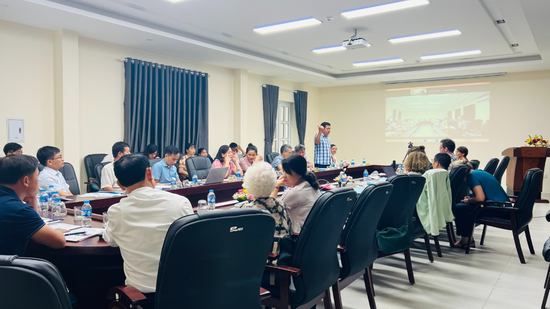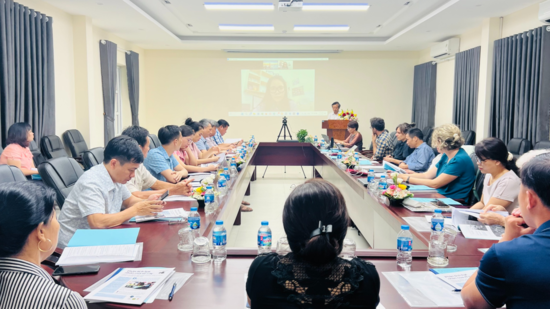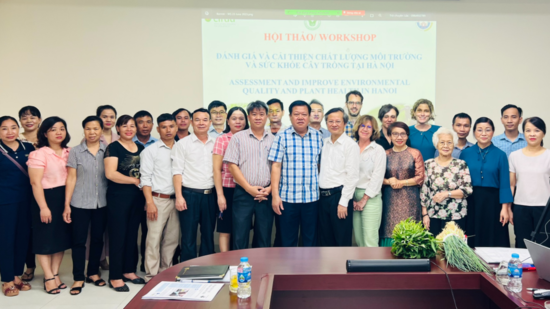Assessment and Improvement of Environmental Quality and Plant Health in Hanoi
On June 23, 2023, the Fruit and Vegetable Research Institute (FAVRI) in collaboration with the French Agricultural Research Centre for International Development (CIRAD) organized a conference on "Assessment and Improvement of Environmental Quality and Plant Health in Hanoi". The conference aimed to share the results of environmental analysis and safety assessments conducted on morning glory and spring onions in the Hanoi region. Based on these findings, participants engaged in discussions to identify solutions for minimizing pollution risks to agricultural land in urban and peri-urban areas, as well as providing recommendations for improving the safety standards of vegetables.
The workshop included representatives from various organizations, including the Department of Agriculture and Rural Development (DARD) of Hanoi, research institutions (such as the French National Center for Scientific Research (CNRS), the National Research Institute for Agricultural, Food, and the Environment (INRAE), and CIRAD), and delegates from the Fruit and Vegetable Research Institute (FAVRI), the Vietnam National University of Agriculture (VNUA), the Plant Protection Institute (PPI), and the Hanoi Union of Science and Technology Associations. Stakeholders in the vegetable value chain, including producers, buyers (from Me Linh, Soc Son, Thuong Tin, Thanh Tri, and Chuong My districts where morning glory and spring onions were sampled), and consumers were also present.
On behalf of the organizing committee, Ms. Nguyen Thi Thoa, representing the Hanoi Union of Science and Technology Associations, explained the purpose of the conference and introduced the participants. Next, Assoc. Prof. Dr. Nguyen Quoc Hung opened the workshop.
Before going into the main content, Dr. Gwenn Pulliat, the project director of the "Street Food" project, presented an overview of the project. The "Street Food" project (2019-2023) is being conducted in the context of Hanoi's rapid expansion into agricultural areas. Its objective is to investigate cell contamination and measure heavy metal levels in water to assess the environmental impact on the health of crops and fish. The study focuses on morning glory and spring onion, which are commonly produced and consumed in Vietnam. The conference aims to share research findings and facilitate discussions among delegates to identify pollution risks and enhance effective prevention strategies.
To provide an overview of agricultural production and the production of safe vegetables in Hanoi, Mr. Nguyen Manh Phuong, the Deputy Director of the Department of Agriculture and Rural Development, shared his insights on the topic. He emphasized the crucial role of agriculture, particularly during the pandemic, and stressed the need for government investment in public support for agricultural enterprises and farmers to ensure optimal production conditions. He also discussed future policy mechanisms for agriculture in the capital, specifically highlighting the direction of organic vegetable production as a means to gradually improve the environment and meet the increasing demand for organic products in Hanoi.
Following the program, Dr. Geneviève Conéjéro, an expert from INRAE, presented the results of the biological analysis of morning glory and spring onion, and introduced tools for assessing the agricultural environment. This content generated significant interest among delegates, many of whom are residents and consumers of vegetables within the city. Producers were particularly pleased to learn about the presence of heavy metals in the soil, their sources, and which parts of the plants accumulate them.
From a regulatory standpoint, Mr. Nguyen Van Minh, the Deputy Head of the Quality Management Department at the Hanoi Agro-Forestry-Fisheries Quality Assurance Sub-Department (NAFIQUARD), shared information with delegates about the overall picture of quality management for safe vegetable products in Hanoi.
Through the presentations, the delegates gained an understanding of the factors leading to the compromised safety of vegetables, the contaminated parts of vegetables, and the research results of morning glory and spring onion samples. Consequently, they became aware of the significant impact unsafe vegetable products can have on consumer health, which is often silent and can lead to serious diseases.
Lastly, a presentation on "Methods to Improve the Safety of Vegetables" provided farmers with insights into various methods for preventing pests and diseases, thereby reducing the use of pesticides in vegetable cultivation.
All workshop participants highly appreciated the shared content, and everyone looks forward to the improvement of vegetable safety through the collectively identified recommendations and solutions.
Nguyen Thi Sau and Nguyen Manh Dat - FAVRI
Published: 27/06/2023



